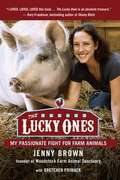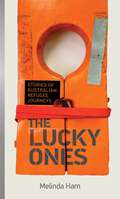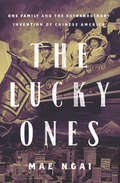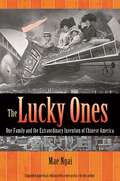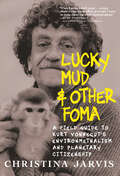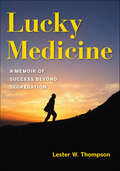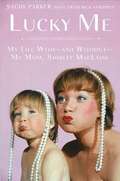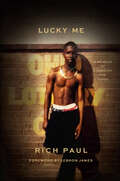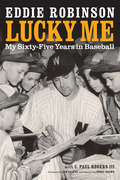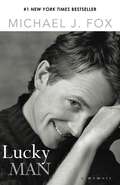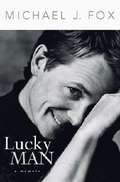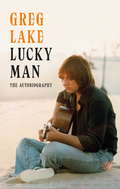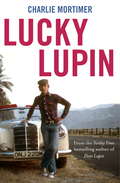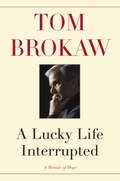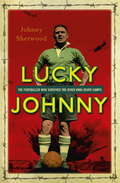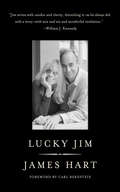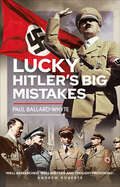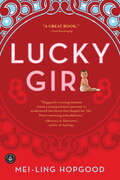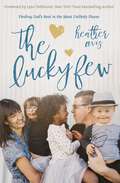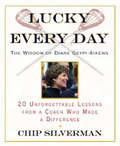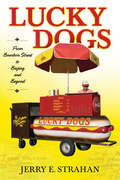- Table View
- List View
A lucky person has only to be born
by Robert K. BurnsThe potato famine forced his ancestors to leave the “Ould Sod” and to plant roots in Askeaton, Wisconsin. Eighty years later and in the year of Ireland’s Independence, the author, Robert K. Burns, was born in Kaukauna, Wisconsin, on November 10, 1922. He was the second-born of the eventual six-child family of his railroading father and loving mother, born Florence Campbell of Hilbert, Wisconsin. The world welcomed this delightfully “Irish” free-spirit during an era of peace and close family relationships and at a time when the phrase “For God and Country” was a way of life and family entertainment was the primary source of social pleasure. Bob’s wit, insight, and innate wisdom, helped him accept and enjoy God’s simplest or most complex creations and creatures. His love, compassion, and understanding made him a joy to his family, his friends, and later in his profession as a dentist to his patients. As a result of the Great Depression the railroad failed. Bob’s father took the family back to a small farm in Askeaton, Wisconsin, the locale of many of the events he recalls in his book from 1933 even to this day, for his new Irish cottage is located within a mile of the old farmhouse. Troubles for most Americans during the thirties were numerous and varied. Bob’s eternal optimism, however, enabled him to help himself and his family soar over them. He was finding silver linings, roses, and rainbows long before it became fashionable for many to even look for them. He was and still is a happy Catholic whose faith, hope and love are constantly tested and challenged. “Being born” to him was synonymous with good luck and God’s blessings. Perceiving humor in mettle-testing obstacles that God cast into his pathway he reacted with witty mainspring resilience and mature good-natured responses. Even in the hemophiliac conditions of his three sons he was able to find enough humor to give strength to his wife, Ginny, his family and himself. God’s designs were his construction blueprints for a life that had to be lived to be enjoyed. Although he is aware of the imperfections of man and that man-made plans often go awry, he never forgets that God created smiles for good purpose. His forte is his ability to induce smiling in others. My greatest pleasure in encouraging Bob to publish his prose and poetry will be the first smile he evokes from you, the reader. Then I will know that I have not misjudged the purpose behind the humble wit and wisdom of my life-long companion and wholly unselfish buddy. May you and the author react favorably to one another. May Heaven’s door be open to both of ye and may God save ye kindly. —Daniel J. Burns, Jr.
The Lucky Ones
by Jenny BrownJonathan Safran Foer meets Jeffrey Moussaieff Mason in a poignant, provocative memoir of survival, compassion, and awakening to the reality of our food system. Jenny Brown was ten years old when she lost a leg to bone cancer. Throughout the ordeal, her constant companion was a cat named Boogie. Years later, she would make the connection between her feline friend and the farm animals she ate, acknowledging that most of America's domesticated animals live on industrialized farms, and are viewed as mere production units. Raised in a conservative Southern Baptist family in Kentucky, Brown had been taught to avoid asking questions. But she found her passion and the courage to speak out. The Lucky Ones introduces readers to Woodstock Farm Animal Sanctuary which Brown established with her husband in 2004. With a cast of unforgettable survivors, including a fugitive slaughterhouse cow named Kayli; Albie, the three-legged goat; and Quincy, an Easter duckling found abandoned in New York City, The Lucky Ones reveals shocking statistics about the prevalence of animal abuse throughout America's agribusinesses. Blending wry humor with unflinching honesty, Brown brings a compelling new voice to the healthy-living movement--and to the vulnerable, voiceless creatures among us.
Lucky Ones: Stories of Australian refugee journeys
by Melinda HamThe Lucky Ones is a moving and meticulously researched book of refugee stories from award-winning journalist and former foreign correspondent Melinda Ham.Though they are from different generations, countries and cultures, the families in this book all have one thing in common: they have escaped persecution in their homelands to find safety in Australia. Spanning 70 years, and tracking journeys from Iraq, Afghanistan, Poland, Tibet, Vietnam and Zaire, The Lucky Ones offers a window into the complex history of Australian refugee experiences.More than 35 million refugees around the world are currently waiting to be resettled. In their own words, the people in this book are some of the 'lucky ones' who survived terror, detention, beatings and torture to reach a country that offered them a new beginning.
The Lucky Ones: One Family and the Extraordinary Invention of Chinese America
by Mae NgaiIf you're Irish American or African American or Eastern European Jewish American, there's a rich literature to give you a sense of your family's arrival-in-America story. Until now, that hasn't been the case for Chinese Americans. From noted historian Mae Ngai, The Lucky Ones uncovers the three-generational saga of the Tape family. It's a sweeping story centered on patriarch Jeu Dip's (Joseph Tape's) self-invention as an immigration broker in post-gold rush, racially explosive San Francisco, and the extraordinary rise it enables. Ngai's portrayal of the Tapes as the first of a brand-new social type--middle-class Chinese Americans, with touring cars, hunting dogs, and society weddings to broadcast it--will astonish. Again and again, Tape family history illuminates American history. Seven-year-old Mamie Tape attempts to integrate California schools, resulting in the landmark 1885 Tape v. Hurley. The family's intimate involvement in the 1904 St. Louis World's Fair reveals how the Chinese American culture brokers essentially invented Chinatown--and so Chinese culture--for American audiences. Finally, Mae Ngai reveals aspects--timely, haunting, and hopeful--of the lasting legacy of the immigrant experience for all Americans.
The Lucky Ones: One Family and the Extraordinary Invention of Chinese America - Expanded paperback Edition
by Mae M. NgaiThe Lucky Ones uncovers the story of the Tape family in post-gold rush, racially explosive San Francisco. Mae Ngai paints a fascinating picture of how the role of immigration broker allowed patriarch Jeu Dip (Joseph Tape) to both protest and profit from discrimination, and of the Tapes as the first of a new social type--middle-class Chinese Americans. Tape family history illuminates American history. Seven-year-old Mamie attempts to integrate California schools, resulting in the landmark 1885 case Tape v. Hurley. The family's intimate involvement in the 1904 St. Louis World's Fair reveals how Chinese American brokers essentially invented Chinatown, and so Chinese culture, for American audiences. Finally, The Lucky Ones reveals aspects--timely, haunting, and hopeful--of the lasting legacy of the immigrant experience for all Americans. This expanded edition features a new preface and a selection of historical documents from the Chinese exclusion era that forms the backdrop to the Tape family's story.
Lucky Mud & Other Foma: A Field Guide to Kurt Vonnegut's Environmentalism and Planetary Citizenship
by Christina JarvisA fascinating deep dive into Kurt Vonnegut&’s oeuvre and legacy, illuminating his unique perspective on environmental stewardship and our shared connections as humans, Earthlings, and stardust.Vonnegut&’s major apocalyptic trio—Cat&’s Cradle, Slapstick, and Galápagos—prompt broad global, national, and species-level thinking about environmental issues through dramatic and fantastic scenarios. This book, Lucky Mud and Other Foma, tells the story of the origins and legacy of what Kurt Vonnegut understood as &“planetary citizenship&” and explores key roots, influences, literary techniques, and artistic expressions of his interest in environmental activism through his writing. Vonnegut saw writing itself as an act of good citizenship, as a way of &“poisoning&” the minds of young people &“with humanity . . . to encourage them to make a better world.&” Often that literary activism meant addressing real social and environmental problems—polluted water, soil, and air; racial and economic injustice; isolating and dehumanizing technologies; and lives and landscapes desolated by war. Vonnegut&’s remedies took many forms, from the redemptive power of the arts to artificial extended families to vital communities and engaged democracies. Reminding us of our shared connections as humans, as Earthlings, as stardust, Lucky Mud helps fans, scholars, and book lovers of all kinds experience how Vonnegut&’s writings purposely challenge readers to think, create, and love.
Lucky Medicine: A Memoir of Success beyond Segregation (Well House Bks.)
by Lester W. ThompsonA remarkable, personal glimpse of Black student life at Indiana University in the early 1960s. In 1961, a skinny African American boy from Indianapolis arrived at Indiana University Bloomington determined to become a doctor. For the next three years, Lester Thompson kept a detailed, intimate diary of his journey to graduation. In Lucky Medicine, Lester returns to his long-ago journal and, with honesty, humor, and a healthy dose of rueful self-reflection, shares stories from his college years at Indiana University. Fascinating glimpses emerge of Black Greek life at the time, including the building of the Kappa Alpha Psi fraternity house and the successes, struggles, and social lives of its members. Lester's student years were driven by hard work, but also bustled with fun and drama. He recalls his time studying at the university library, falling in and out of love many times, becoming friends with fellow fraternity brother Booker T. Jones, a truly memorable invitation extended to meet with George Wallace, and an epic, no-holds-barred brawl with limestone cutters at the 24-Hour Grill. Lucky Medicine offers a closeup, unforgettable look at IU student life just before the sweeping social changes of the 1960s, when students of color accounted for less than 2 percent of the Indiana University's student body.
Lucky Me
by Sachi ParkerSachi Parker opens up about her unconventional childhood and shares stories from her past as the only child of famed actress Shirley MacLaine. Shirley MacLaine has graced Hollywood with her talent for decades. Yet, as Sachi Parker can attest, being the daughter of a movie star was far from picture-perfect. In Lucky Me, the only child of the Academy Award-winning actress opens up about her unique experiences of growing up with a mother who believed in reincarnation and extraterrestrials--but not necessarily parenthood. Lucky Me is not only Sachi's personal story but also a compelling snapshot of America in the second half of the twentieth century, from the Rat Pack world of the '60s through the free-love '70s to the new-age self-absorption of the present. It offers a compelling insight into the politics of Hollywood, where the fight for the spotlight never ends and your fiercest rivals are closer than you think. There are Sachi's warm and admiring remembrances of legendary actors--Jack Nicholson, Jack Lemmon, Robert Mitchum, her uncle Warren Beatty--as well as acid-sharp portraits of the schemers and buffoons who roam the hills of La-La Land. Ultimately Lucky Me is a bittersweet love letter to a mother who is at once a universally beloved and larger-than-life figure and yet always seems beyond reach.
Lucky Me: A Memoir of Changing the Odds
by Rich PaulA memoir of will, success, and the luck we make—from the founder and CEO of Klutch Sports Group and one of the most influential figures in the multibillion-dollar sports industry. <p><p> There’s a story about Rich Paul that everyone knows: A twenty-one-year-old kid from Cleveland who sells sports jerseys out of his car meets a high school basketball phenom named LeBron James at an airport—the two become friends and forge a decades-long partnership that reinvents the business of sports. That random meeting might seem like the lucky break that changed Paul’s life. But a moment of good fortune means nothing without the struggle that gets you there. And the truth is, Paul had always been lucky. <p><p> Rich Paul became a gambler at an early age—his fast mind and gift for finding an edge made him a devastating dice roller who could hold his own with grown men, win big, and walk away alive. Shooting dice wasn’t just a pastime; it was a way to earn money for his family as his mother struggled under the weight of drug addiction. He learned the secret science of dice in the same place he found all the lessons of his young life: the corner store his father operated, the center of the neighborhood’s frantic action. Paul’s father had another family but kept his son close working at the store. Paul dreamed of becoming a star athlete, but the streets were where he thrived, building a lucrative enterprise on shaky ground. When he found himself at a dangerous crossroads, he summoned the teachings of his past to create a different future. <p><p> Readers will follow the riveting journey of a young Rich Paul narrated by the Paul of today, who looks back with wit and insight, drawing out the lessons he learned at every stage—about business, people, and the values that lead to success. It’s the inspiring story of the luck that’s all around us, if we know where to look. <p> <b>New York Times Bestseller</b>
Lucky Me: My Sixty-Five Years in Baseball
by Eddie Robinson C. Paul RogersEddie Robinson&’s career lasted sixty-five years and spanned the era before and during World War II, integration, the organization of the players union, expansion, use of artificial turf, free agency, labor stoppages, and even the steroid era. He was a Minor League player, a Major League player, a coach, a farm director, a general manager, a scout, and a consultant. During his six and a half decades in baseball, he knew, played with or against, or worked for or with many of baseball&’s greats, including Hank Aaron, Yogi Berra, Joe DiMaggio, Bob Feller, Rogers Hornsby, Mickey Mantle, Satchel Paige, Jackie Robinson, Babe Ruth, Tris Speaker, George Steinbrenner, Casey Stengel, Bill Veeck, and Ted Williams. The lively autobiography of Robinson, Lucky Me highlights a career that touched all aspects of the game from player to coach to front-office executive and scout. In it Robinson reveals for the first time that the 1948 Cleveland Indians stole the opposition&’s signs with the use of a telescope in their drive to the pennant. This edition features a new afterword by C. Paul Rogers III.
Lucky Man: A Memoir
by Michael J. FoxA funny, highly personal, gorgeously written account of what it's like to be a 30-year-old man who is told he has an 80-year-old's disease. "Life is great. Sometimes, though, you just have to put up with a little more crap." --Michael J. Fox In September 1998, Michael J. Fox stunned the world by announcing he had been diagnosed with Parkinson's disease--a degenerative neurological condition. In fact, he had been secretly fighting it for seven years. The worldwide response was staggering. Fortunately, he had accepted the diagnosis and by the time the public started grieving for him, he had stopped grieving for himself. Now, with the same passion, humor, and energy that Fox has invested in his dozens of performances over the last 18 years, he tells the story of his life, his career, and his campaign to find a cure for Parkinson's. Combining his trademark ironic sensibility and keen sense of the absurd, he recounts his life--from his childhood in a small town in western Canada to his meteoric rise in film and television which made him a worldwide celebrity. Most importantly however, he writes of the last 10 years, during which--with the unswerving support of his wife, family, and friends--he has dealt with his illness. He talks about what Parkinson's has given him: the chance to appreciate a wonderful life and career, and the opportunity to help search for a cure and spread public awareness of the disease. He is a very lucky man, indeed. The Michael J. Fox FoundationMichael J. Fox is donating the profits from his book to the Michael J. Fox Foundation for Parkinson's Research, which is dedicated to fast-forwarding the cure for Parkinson's disease. The Foundation will move aggressively to identify the most promising research and raise the funds to assure that a cure is found for the millions of people living with this disorder. The Foundation's web site, MichaelJFox.org, carries the latest pertinent information about Parkinson's disease, including: A detailed description of Parkinson's disease How you can help find the cure Public Services Announcements that are aired on network and cable television stations across the country to increase awareness Upcoming related Parkinson's disease events and meetings Updates on recent research and developments
Lucky Man
by Michael J. FoxIn September 1998, Michael J. Fox stunned the world by announcing he had been diagnosed with Parkinsons disease degenerative neurological condition. In fact, he had been secretly fighting it for seven years. The worldwide response was staggering. Fortunately, he had accepted the diagnosis and by the time the public started grieving for him, he had stopped grieving for himself. Now, with the same passion, humor, and energy that Fox has invested in his dozens of performances over the last 18 years, he tells the story of his life, his career, and his campaign to find a cure for Parkinsons. Combining his trademark ironic sensibility and keen sense of the absurd, he recounts his life from his childhood in a small town in western Canada to his meteoric rise in film and television which made him a worldwide celebrity. Most importantly however, he writes of the last 10 years, during which with the unswerving support of his wife, family, and friends he has dealt with his illness. He talks about what Parkinsons has given him: the chance to appreciate a wonderful life and career, and the opportunity to help search for a cure and spread public awareness of the disease. He is a very lucky man, indeed.
Lucky Man: The Autobiography
by Greg LakeGreg Lake first won acclaim as lead vocalist, bass guitarist and producer when, together with Robert Fripp, he formed King Crimson. Their first album, the landmark In the Court of the Crimson King, co-produced by Greg, featured the iconic song '21st Century Schizoid Man'. King Crimson pioneered progressive rock and paved the way for many famous bands that followed, from Yes and Genesis to the Red Hot Chilli Peppers.In 1970 Greg met fellow legend Keith Emerson during a North American tour; the two shared common bonds: European musical influences and a desire to reinterpret classical works while creating a new musical genre. After being introduced to drummer Carl Palmer, they formed the first progressive rock supergroup Emerson, Lake and Palmer.To date ELP has sold over 50 million records. Lake produced Emerson, Lake & Palmer, Tarkus, Pictures at an Exhibition, Trilogy, Brain Salad Surgery, Works Vol. 1 and 2, and two different live albums. All went platinum and featured a series of hit singles, most written and all sung by Lake. The three created a unique live theatrical performance which featured Emerson attacking his keyboards with knives, Palmer playing a 2.5 ton stainless steel kit and Lake performing on a £6,000 Persian rug which had its own roadie. One of their very first performances was at the historic Isle of Wight Festival in 1970 and they went on to headline California Jam, one of the biggest concerts of the 1970s, attended by 350,000 people.Probably the voice of his generation, Greg fronted the greatest rock supergroup of the 1970s but never held with the 'progressive' tag that attached itself to both the music and the excess. Lucky Man not only charts the highs and lows of a career in rock music but also reflects on the death of Keith Emerson last year, living with terminal cancer and the end of life. Greg can best be summed up by his now-famous line: 'Material wealth is a very fleeting pleasure ... when you can buy anything you want and do anything you want, you soon discover that you actually don't want any of it.'
Lucky Man: The Autobiography
by Greg LakeGreg Lake first won acclaim as lead vocalist, bass guitarist and producer when, together with Robert Fripp, he formed King Crimson. Their first album, the landmark In the Court of the Crimson King, co-produced by Greg, featured the iconic song '21st Century Schizoid Man'. King Crimson pioneered progressive rock and paved the way for many famous bands that followed, from Yes and Genesis to the Red Hot Chilli Peppers.In 1970 Greg met fellow legend Keith Emerson during a North American tour; the two shared common bonds: European musical influences and a desire to reinterpret classical works while creating a new musical genre. After being introduced to drummer Carl Palmer, they formed the first progressive rock supergroup Emerson, Lake and Palmer.To date ELP has sold over 50 million records. Lake produced Emerson, Lake & Palmer, Tarkus, Pictures at an Exhibition, Trilogy, Brain Salad Surgery, Works Vol. 1 and 2, and two different live albums. All went platinum and featured a series of hit singles, most written and all sung by Lake. The three created a unique live theatrical performance which featured Emerson attacking his keyboards with knives, Palmer playing a 2.5 ton stainless steel kit and Lake performing on a £6,000 Persian rug which had its own roadie. One of their very first performances was at the historic Isle of Wight Festival in 1970 and they went on to headline California Jam, one of the biggest concerts of the 1970s, attended by 350,000 people.Probably the voice of his generation, Greg fronted the greatest rock supergroup of the 1970s but never held with the 'progressive' tag that attached itself to both the music and the excess. Lucky Man not only charts the highs and lows of a career in rock music but also reflects on the death of Keith Emerson last year, living with terminal cancer and the end of life. Greg can best be summed up by his now-famous line: 'Material wealth is a very fleeting pleasure ... when you can buy anything you want and do anything you want, you soon discover that you actually don't want any of it.'
Lucky Lupin
by Charlie MortimerLucky Lupin is a poignant yet light-hearted story of survival against the odds, based on Charlie Mortimer's life with HIV/Aids during the early years (1984-1996), when there was neither treatment nor cure. Using a combination of good luck, gallows humour, Fray Bentos pies and copious quantities of Solpadeine, Charlie survived not only the illness but the hysteria that accompanied the so-called 'gay plague'. Anyone infected became a social pariah; had the local launderette got word of his illness they wouldn't have washed his sheets but burnt them. Whilst taking full responsibility for the consequences of his behaviour - 'The fact is you don't get AIDS from watching telly' - Charlie initially took to the sofa and prepared for death, but, in time, he found the inner strength required to confront his fatal diagnosis, becoming, among other things, an antiques dealer and contemporary art collector.With blistering and often hilarious candour Charlie also recounts his childhood where he developed a passion for cars, cultivated by his adventurous mother 'Nidnod', his dizzying array of careers and somewhat curious domestic arrangements including the 'adoption' of a bank robber for twelve years. He also confronts head on his experiences of coming to terms with confused sexuality, addiction, epilepsy and clinical depression before finding lasting contentment.Praise for Dear Lupin:'As well as being the funniest book I've read in ages, it's also extremely touching. A delight then, on every front.' The Spectator 'Very, very funny.' Sunday Times'Wry, trenchant, often extremely funny, but also charmingly forbearing and forgiving.' Country Life
Lucky Lupin: A Memoir
by Charlie MortimerLucky Lupin is a poignant yet light-hearted story of survival against the odds, based on Charlie Mortimer's life with HIV/Aids during the early years (1984-1996), when there was neither treatment nor cure. Using a combination of good luck, gallows humour, Fray Bentos pies and copious quantities of Solpadeine, Charlie survived not only the illness but the hysteria that accompanied the so-called 'gay plague'. Anyone infected became a social pariah; had the local launderette got word of his illness they wouldn't have washed his sheets but burnt them. Whilst taking full responsibility for the consequences of his behaviour - 'The fact is you don't get AIDS from watching telly' - Charlie initially took to the sofa and prepared for death, but, in time, he found the inner strength required to confront his fatal diagnosis, becoming, among other things, an antiques dealer and contemporary art collector.With blistering and often hilarious candour Charlie also recounts his childhood where he developed a passion for cars, cultivated by his adventurous mother 'Nidnod', his dizzying array of careers and somewhat curious domestic arrangements including the 'adoption' of a bank robber for twelve years. He also confronts head on his experiences of coming to terms with confused sexuality, addiction, epilepsy and clinical depression before finding lasting contentment.Praise for Dear Lupin:'As well as being the funniest book I've read in ages, it's also extremely touching. A delight then, on every front.' The Spectator 'Very, very funny.' Sunday Times'Wry, trenchant, often extremely funny, but also charmingly forbearing and forgiving.' Country Life
A Lucky Life Interrupted
by Tom BrokawFrom Tom Brokaw, the bestselling author of The Greatest Generation, comes a powerful memoir of a year of dramatic change--a year spent battling cancer and reflecting on a long, happy, and lucky life. Tom Brokaw has led a fortunate life, with a strong marriage and family, many friends, and a brilliant journalism career culminating in his twenty-two years as anchor of the NBC Nightly News and as bestselling author. But in the summer of 2013, when back pain led him to the doctors at the Mayo Clinic, his run of good luck was interrupted. He received shocking news: He had multiple myeloma, a treatable but incurable blood cancer. Friends had always referred to Brokaw's "lucky star," but as he writes in this inspiring memoir, "Turns out that star has a dimmer switch." Brokaw takes us through all the seasons and stages of this surprising year, the emotions, discoveries, setbacks, and struggles--times of denial, acceptance, turning points, and courage. After his diagnosis, Brokaw began to keep a journal, approaching this new stage of his life in a familiar role: as a journalist, determined to learn as much as he could about his condition, to report the story, and help others facing similar battles. That journal became the basis of this wonderfully written memoir, the story of a man coming to terms with his own mortality, contemplating what means the most to him now, and reflecting on what has meant the most to him throughout his life. Brokaw also pauses to look back on some of the important moments in his career: memories of Nelson Mandela, the Dalai Lama, the fall of the Berlin Wall, the morning of September 11, 2001, in New York City, and more. Through it all, Brokaw writes in the warm, intimate, natural voice of one of America's most beloved journalists, giving us Brokaw on Brokaw, and bringing us with him as he navigates pain, procedures, drug regimens, and physical rehabilitation. Brokaw also writes about the importance of patients taking an active role in their own treatment, and of the vital role of caretakers and coordinated care. Generous, informative, and deeply human, A Lucky Life Interrupted offers a message of understanding and empowerment, resolve and reality, hope for the future and gratitude for a well-lived life.From the Hardcover edition.
Lucky Johnny: The Footballer who Survived the River Kwai Death Camps
by Johnny SherwoodIn 1938 Johnny Sherwood was a young professional footballer on the brink of an England career, touring the world with the all-star British team the Islington Corinthians. By 1942 he was a soldier surrendering to the Japanese at the siege of Singapore. Taken prisoner he was sent to a POW camp deep in the heart of the Thai jungle, where he was starved, beaten, and forced to build the notorious 'railway of death' on the River Kwai. Johnny kept his and his men's spirits up with tales of his footballing past, even organising matches until he and the other prisoners became too weak to play. One day, he even encountered a brutal Japanese guard, and was shocked to recognise him as a Japanese footballer Johnny had played against. Many years after Johnny's death, his grandson Michael discovered an old manuscript hidden in the attic of his mother's house. It was Johnny's own account of his wartime experiences - the story too horrific to reveal in full to his loved ones. In the tradition of bestselling memoirs like The Railway Man, Lucky Johnny is an inspirational tale of survival against the odds.
Lucky Johnny: The Footballer who Survived the River Kwai Death Camps
by Johnny SherwoodIn 1938 Johnny Sherwood was a young professional footballer on the brink of an England career, touring the world with the all-star British team the Islington Corinthians. By 1942 he was a soldier defending Singapore against the Japanese. Taken prisoner he was sent to a POW camp deep in the heart of the Thai jungle, where he was starved, beaten, and forced to build the notorious 'railway of death' on the River Kwai. Johnny kept his and his men's spirits up with tales of his footballing past, even organising matches until he and the other prisoners became too weak to play. One day, he encountered a brutal Japanese guard, and was shocked to recognise him as a Japanese footballer Johnny had played against. Despite the inhumane treatment he received at the hands of the guards, and the trials the POWs continued to face even after liberation, Johnny's story is an inspirational tale of survival against the odds. Many years after Johnny's death, his grandson Michael discovered an old manuscript hidden in the attic of his mother's house. It was Johnny's own account of his wartime experiences - the story too horrific to reveal to his loved ones. Now, in publishing Johnny's memoirs, Michael is finally fulfilling Johnny's wish that the world should know the truth about his traumatic time as a POW, and his long journey back to civilisation.
Lucky Jim
by James Hart Carl BernsteinLucky Jim is the memoir of writer Jim Hart, the story of how he survived a violent childhood home, created a love that was both so right and so wrong, overcame obsessive dependencies, and finally found the strength to be his true self. Jim is a master at building relationships. Charming, funny, and a great listener, his success in life and business was based on his ability to connect with others, from people recovering in 12-step groups in Upstate New York to those living in the rarified air of Martha’s Vineyard. But after more than twenty years sober, one slip-up triggered an active addiction that threatened his relationships with his then-wife, singer-songwriter Carly Simon, his recovery friends, his severely disabled son, and even with himself as he began to confront his sexuality. With profound clarity and thoughtful language, Jim weaves together the beautiful and all-too-often heartbreaking events of his life into an inspiring tale of bravery, healing, and above all, love.
Lucky Hitler's Big Mistakes
by Paul Ballard-WhyteAdolf Hitler’s Great War military experiences in no way qualified him for supreme command. Yet by July 1940, under his personal leadership the Third Reich’s armed forces had defeated Poland, Czechoslovakia, Holland, Denmark, Norway, Belgium and France. The invasion of Great Britain was a distinct reality following Dunkirk. Hungary, Bulgaria and Romania had become allies along with the acquiescent military powers of Mussolini’s Italy and Franco’s Spain. These achievements prompted Field Marshal Willem Keitel, the Wehrmacht’s Chief of Staff, to pronounce Hitler to be ‘the Greatest Commander of all time’. Storm clouds were gathering, most notably the disastrous decision to tear up the treaty with the Soviet Union and launch Operation Barbarossa in 1941. As described in this meticulously researched and highly readable book, Hitler’s blind ideology, racist hatred and single-mindedness led him and his allies inexorably to devastating defeat. How far was it good luck that gave Hitler his sensational early political and military successes? Certainly fortune played a major role in his survival from many assassination attempts and sex scandals. The author concludes, from 1941 onwards, the Fuhrer’s downfall was entirely attributable to military misjudgments that he alone made. Lucky: Hitler’s Big Mistakes exposes the enigmatic Dictator for what he really was – incredibly lucky and militarily incompetent.
Lucky Girl
by Mei-Ling HopgoodIn a true story of family ties, journalist Mei-Ling Hopgood, one of the first wave of Asian adoptees to arrive in America, comes face to face with her past when her Chinese birth family suddenly requests a reunion after more than two decades.In 1974, a baby girl from Taiwan arrived in America, the newly adopted child of a loving couple in Michigan. Mei-Ling Hopgood had an all-American upbringing, never really identifying with her Asian roots or harboring a desire to uncover her ancestry. She believed that she was lucky to have escaped a life that was surely one of poverty and misery, to grow up comfortable with her doting parents and brothers. Then, when she's in her twenties, her birth family comes calling. Not the rural peasants she expected, they are a boisterous, loving, bossy, complicated middle-class family who hound her daily—by phone, fax, and letter, in a language she doesn't understand—until she returns to Taiwan to meet them. As her sisters and parents pull her into their lives, claiming her as one of their own, the devastating secrets that still haunt this family begin to emerge. Spanning cultures and continents, Lucky Girl brings home a tale of joy and regret, hilarity, deep sadness, and great discovery as the author untangles the unlikely strands that formed her destiny.
The Lucky Few: Finding God's Best in the Most Unlikely Places
by Heather Avis Lysa TerKeurst, New York Times bestselling authorThese are the faces that call me “mom,” the three children who made me a mother. When I started my journey into parenthood I never thought it would look like this. I never planned on having three adopted children, and I certainly never imagined that two of them would have Down syndrome. But like most of the things God does, once we stepped into the craziness and confusion of the unknown and unplanned, we quickly realized that we were indeed among the lucky few. When my husband and I decided to grow our family ten years ago, we were surprised to find that getting pregnant was not as easy as we had thought it would be. And as we navigated the ups and downs of infertility, God led us down the path of adoption. Of course, we would adopt! Not what we had originally planned, but certainly a wonderful option. But just as we began to get a comfortable grasp on growing our family through adoption, God introduced us to Macyn Hope, a very sick little girl with Down syndrome who desperately needed a family. As we continued to follow God’s calling, first with Macyn, and later with Truly and then August, we found ourselves further and further from the comfortable paths we thought our lives would take, and instead moving down some very scary, and often painful roads. Even though at times His plan seemed terrifying and even downright foolish, little could we have known how much goodness, blessing, and joy would flow out of loving these three little people He’s put into our lives. No, it’s not been easy: not the open-heart surgeries or the challenges of raising two children with Down syndrome or the complexities of dealing with birth-families or the struggles we’ve had with the public education system. But through it all, every new and uncomfortable situation has only proven to be another chance to see how very good God’s plan is for our lives and how downright lucky we are to be able to live it out. It’s only the lucky few that recognize that the most beautiful things in this life are often found in the differences. What some would see as misfortune, I’ve learned to see as nothing more than pure luck.
Lucky Every Day: 20 Unforgettable Lessons from a Coach Who Made a Difference
by Chip SilvermanIn the bestselling tradition of Ten Things I Wish I'd Known......and The Right Words at the Right Time comes a collection of inspirational wisdom from beloved lacrosse coach, the late Diane Geppi-Aikens. Loyola College of Maryland Women's Lacrosse Coach Diane Geppi-Aikens would have been a remarkable role model simply as one of the nation's top lacrosse coaches. But this single mother of four battled inoperable brain tumors for eight years. Partially paralyzed and confined to a wheelchair, Geppi-Aikens missed only one game as she coached her #1 ranked team into the semi-finals of the NCAA championships.In spite of the terrible tragedy threatening her life, she managed to get her players to consider her lucky. Now, in the wake of this courageous woman's death comes an incredibly inspirational book. In 20 short chapters, Geppi-Aikens's unique and uplifting teachings live on through the memories of those she inspired most. H In Geppi-Aikens's final season, she and her players made memorable appearances on the Today show, Good Morning America, and CBS Evening News. She was also featured in Sports Illustrated, College Sports TV, and Lacrosse Magazine. H Books offering inspirational advice from high-profile women, such as Maria Shriver's Ten Things I Wish I'd Known.... (Warner, 2000) and Marlo Thomas's The Right Word at the Right Time (Atria, 4/02), are perennial bestsellers. H Diane Geppi-Aikens won the 2003 National Collegiate Athletic Association (NCAA) Inspiration Award. The Intercollegiate Women's Lacrosse Association has renamed their Lifetime Achievement Award in her honor. H Chip Silverman is the author of five books, including Diner Guys (Carroll, 1989) and The Block (Scribe, 1994), which served as the basis for Barry Levinson's famous films, including the classic Diner. He is a former lacrosse player and was also Head Coach for Morgan State College and for the University of Baltimore.
Lucky Dogs: From Bourbon Street to Beijing and Beyond
by Jerry E. StrahanWhen walking the French Quarter and watching a Lucky Dog salesman set up that colorful cart and call out to entice customers, don't you wonder how such a business works? As a knowing review in Rolling Stone stated, "People have always loved the cart and harbored a mysterious need to ride it. Revelers have been known to climb on top of the rolling wienies, screaming 'Yippee kaya!' as vendors stoically push them back to the barn at 4 a.m." Since 1947 the red and yellow carts have trumpeted good fortune and sustenance.Jerry E. Strahan recounts the wild adventures of the Bourbon Street wienie salesmen but also takes readers well beyond New Orleans. In fact, he takes them halfway around the world, where this unique pushcart business maneuvered its way through the bureaucratic red tape of a communist country to become a licensed corporation in the People's Republic of China.In China, two points quickly became apparent to Strahan. First, 99 percent of the Chinese population had no idea what a Lucky Dog cart represented. One elderly passerby declared it to be a missile. Second, the success or failure of any joint venture in the Asian nation is directly proportional to the political clout of that company's local partner.Lucky Dogs also recounts how the business and its vendors survived Hurricane Katrina. Miraculously, it reopened only six months after the storm in a city where more than 80 percent of the landmass had been flooded and where less than 40 percent of the population had returned. To reestablish itself in what many described as Third World conditions, the company had to transform its operation.This work mixes business history, autobiography, survival story, and an insider's look at the bizarre lives of some of Bourbon Street's most quirky characters--the dauntless Lucky Dog vendors. Both humorous and tragic, though it may read like fiction, it is, for better or worse, all fact.

